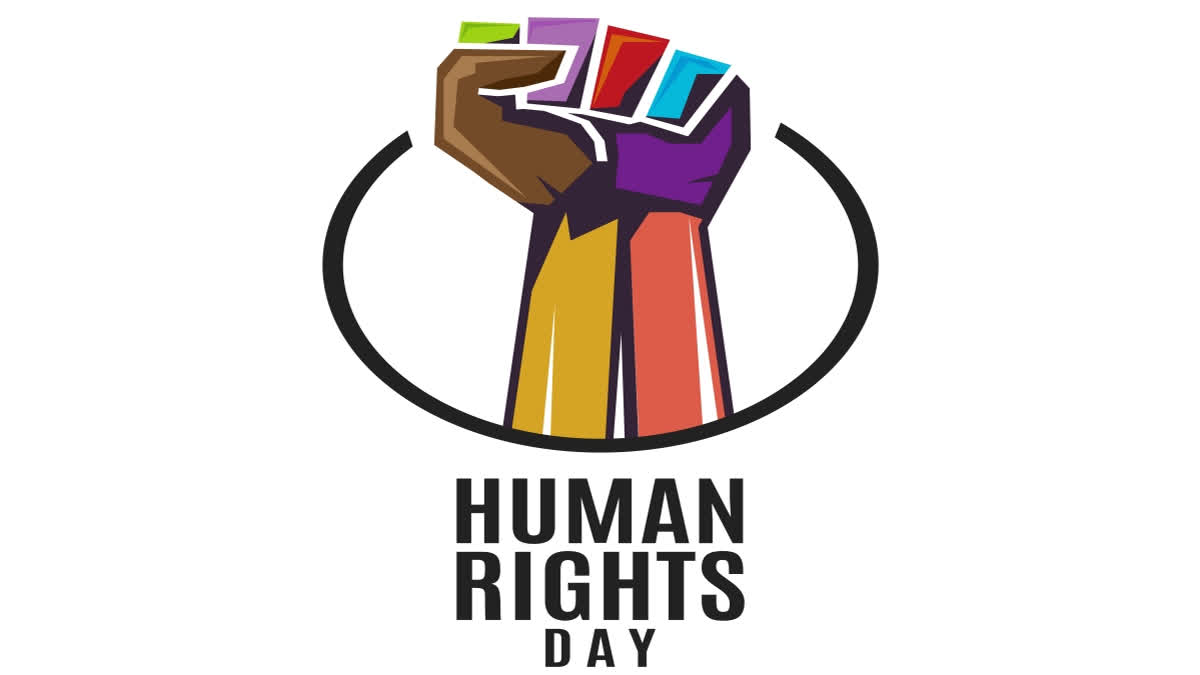Hyderabad: Human Rights Day, observed annually on December 10, serves as a global acknowledgement of a pivotal moment in history—the adoption of the Universal Declaration of Human Rights (UDHR) by the United Nations General Assembly in 1948. This document, proclaiming a set of fundamental rights and freedoms for all, has since played a crucial role in shaping the discourse around human dignity.
History- The formal establishment of Human Rights Day traces back to 1950, following the passage of resolution 423 (V) by the General Assembly. This resolution urged all States and interested organisations to designate December 10 each year as Human Rights Day. Thus, the international community collectively set aside this day to reflect on the principles enshrined in the UDHR and their impact on the world.
Objective- When the General Assembly formed the UDHR, it was hailed as a "common standard of achievement for all peoples and all nations." The Assembly called upon individuals and societies to "strive by progressive measures, national and international, to secure their universal and effective recognition and observance." This visionary declaration laid the foundation for a shared commitment to human rights, transcending geographical, cultural, and political boundaries.
The Universal Declaration shows the way to common values and approaches that can help resolve tensions and create the security and stability our world craves." - UN Secretary-General António Guterres
Rights and freedoms- The UDHR outlines a comprehensive spectrum of rights and freedoms to which every individual is inherently entitled. It guarantees these rights universally, without discrimination based on factors such as nationality, residence, gender, ethnicity, religion, language, or any other status. The UDHR is available in over 500 languages, making it the most translated document globally.
Not legal, but fundamental- While the UDHR itself is not legally binding, its impact reverberates through more than 60 human rights instruments that, collectively, establish an international standard for human rights. Today, the consensus among all United Nations Member States on the fundamental human rights delineated in the Declaration amplifies its strength.
UDHR turns 75- The Universal Declaration of Human Rights will mark its 75th anniversary on December 10, 2023. A year-long initiative focusing on universality, progress and engagement, will culminate in a high-level event in December 2023, which will announce global pledges and ideas for a vision for the future of human rights.
Theme for 2023- The theme for Human Rights Day 2023 is 'Freedom, Equality, and Justice for All'. Since the UDHR's adoption in 1948, there has been increasing global recognition and guarantee of human rights. The UDHR has served as the cornerstone for an expanding system of human rights protection, extending its scope to vulnerable groups, including persons with disabilities, indigenous peoples, and migrants.
Challenges- Yet, the promise of dignity and equality encapsulated in the UDHR faces sustained challenges. Contemporary issues such as pandemics, conflicts, escalating inequalities, a morally compromised global financial system, racism, and climate change threaten these values. In these turbulent times, the principles enshrined in the UDHR serve as guideposts for collective action, ensuring that no one is left behind.
30 articles listed by UDHR which talk of basic human rights and freedom
Article 1- Free and equal
All human beings are born free and equal in dignity and rights. They are endowed with reason and conscience and should act towards one another in a spirit of brotherhood.
Article 2- Freedom from discrimination
Everyone is entitled to all the rights and freedoms set forth in this Declaration, without distinction of any kind, such as race, colour, sex, language, religion, political or other opinion, national or social origin, property, birth or other status. Furthermore, no distinction shall be made based on the political, jurisdictional or international status of the country or territory to which a person belongs, whether it be independent, trust, non-self-governing or under any other limitation of sovereignty.
Article 3- Right to life
Everyone has the right to life and to live in freedom and safety
Article 4- Freedom from slavery
No one shall be held in slavery or servitude; slavery and the slave trade shall be prohibited in all their forms.
Article 5- Freedom from torture
No one shall be subjected to torture or to cruel, inhuman or degrading treatment or punishment.
Article 6- Right to recognition before the law
Everyone has the right to recognition everywhere as a person before the law.
Article 7- Right to equality before the law
All are equal before the law and are entitled without any discrimination to equal protection of the law. All are entitled to equal protection against any discrimination in violation of this Declaration and against any incitement to such discrimination.
Article 8- Access to justice
Everyone has the right to an effective remedy by the competent national tribunals for acts violating the fundamental rights granted him by the constitution or by law.
Article 9- Freedom from arbitrary detention
No one shall be subjected to arbitrary arrest, detention or exile.
Article 10- Right to a fair trial
Everyone is entitled in full equality to a fair and public hearing by an independent and impartial tribunal, in the determination of his rights and obligations and of any criminal charge against him.
Article 11- Presumption of Innocence
1. Everyone charged with a penal offence has the right to be presumed innocent until proven guilty according to law in a public trial at which he has had all the guarantees necessary for his defence.
2. No one shall be held guilty of any penal offence on account of any act or omission which did not constitute a penal offence, under national or international law, at the time when it was committed. Nor shall a heavier penalty be imposed than the one that was applicable at the time the penal offence was committed.
Article 12- Right to privacy
No one shall be subjected to arbitrary interference with his privacy, family, home or correspondence, nor to attacks upon his honour and reputation. Everyone has the right to the protection of the law against such interference or attacks.
Article 13- Freedom of movement
1. Everyone has the right to freedom of movement and residence within the borders of each State.
2. Everyone has the right to leave any country, including his own, and to return to his country.
Article 14- Right to asylum
1. Everyone has the right to seek and to enjoy in other countries asylum from persecution.
2. This right may not be invoked in the case of prosecutions genuinely arising from non-political crimes or from acts contrary to the purposes and principles of the United Nations.
Article 15- Right to nationality
1. Everyone has the right to a nationality.
2. No one shall be arbitrarily deprived of his nationality nor denied the right to change his nationality.
Article 16- Right to marriage and to found a family
1. Men and women of full age, without any limitation due to race, nationality or religion, have the right to marry and to found a family. They are entitled to equal rights as to marriage, during marriage and at its dissolution.
2. Marriage shall be entered into only with the free and full consent of the intending spouses.
3. The family is the natural and fundamental group unit of society and is entitled to protection by society and the State.
Article 17- Right to own property
1. Everyone has the right to own property alone as well as in association with others.
2. No one shall be arbitrarily deprived of his property.
Article 18- Freedom of religion or belief
Everyone has the right to freedom of thought, conscience and religion; this right includes freedom to change his religion or belief, and freedom, either alone or in community with others and in public or private, to manifest his religion or belief in teaching, practice, worship and observance.
Article 19- Freedom of Expression
Everyone has the right to freedom of opinion and expression; this right includes freedom to hold opinions without interference and to seek receive and impart information and ideas though any media and regardless of frontiers.
Article 20- Freedom of assembly
1. Everyone has the right to freedom of peaceful assembly and association.
2. No one may be compelled to belong to an association.
Article 21- Right to partake in public affairs
1. Everyone has the right to take part in the government of his country, directly or through freely chosen representatives.
2. Everyone has the right of equal access to public service in his country.
3.The will of the people shall be the basis of the authority of government; this will be expressed in periodic and genuine elections which shall be by universal and equal suffrage and shall be held by secret vote or by equivalent free voting procedures.
Article 22- Right to social security
Everyone, as a member of society, has the right to social security and is entitled to realization, through national effort and international cooperation and in accordance with the organization and resources of each State, of the economic, social and cultural rights indispensable for his dignity and the free development of his personality.
Article 23- Right to work
Everyone has the right to work in just and favourable conditions and be free to choose your work with a salary that allows you to live and support your family. Everyone should receive equal pay for equal work.
Article 24- Right to leisure and rest
Everyone has the right to rest and leisure, including reasonable limitations of working hours and periodic holidays with pay.
Article 25- Right to adequate standard of living
You have the right to have what you need so that you and your family do not go hungry, homeless or fall ill.
Article 26- Right to education
You have the right to go to school, continue your studies as far as you wish and learn regardless of race, religion or country of origin.
Article 27- Right to take part in cultural, artistic and scientific life
1. Everyone has the right freely to participate in the cultural life of the community, to enjoy the arts and to share in scientific advancement and its benefits.
2. Everyone has the right to the protection of the moral and material interests resulting from any scientific, literary or artistic production of which he is the author.
Article 28- Right to a free and fair world
Everyone is entitled to a social and international order in which the rights and freedoms set forth in this Declaration can be fully realized.
Article 29- Duty to your community
You have duties toward the community within which your personality can fully develop. The law should guarantee human rights. It should allow everyone to respect others and to be respected.
Article 30- Rights are inalienable
Nothing in this Declaration may be interpreted as implying for any State, group or person any right to engage in any activity or to perform any act aimed at the destruction of any of the rights and freedoms set forth herein.


